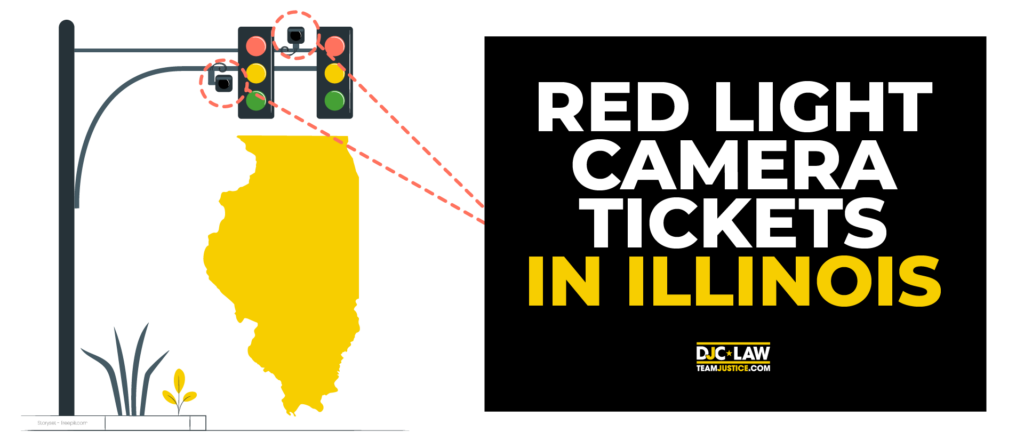
The Federal Highways Administration took a poll and found that one in three drivers admitted to running a red light in the last 30 days alone. The dangers are clear, yet people still try to “beat the lights” to save a few minutes on their journeys.
In this guide, we’ll discuss red light cameras in Illinois, how they’re trying to put an end to running red lights, and what you can do if you get a red light camera ticket.
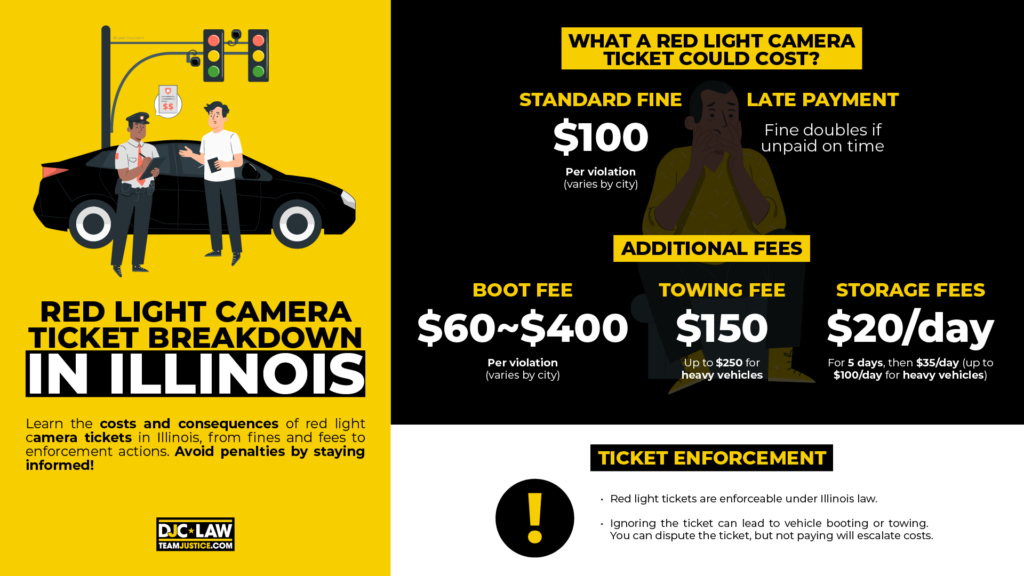
Key Takeaways
Red light cameras are automated cameras that take pictures and video footage when a driver enters an intersection when a traffic signal turns red.
Illinois’ red light cameras rely on traffic sensors to detect when drivers run red lights and then issue tickets automatically.
Ticket issuances for red light violations have been legalized in Illinois since 2003 and form part of the automated traffic enforcement system, thus making them entirely enforceable.
Standard fines for red light violations are $100, with additional booting and towing charges if these tickets remain unpaid.
Running a red light isn’t considered a moving violation, so it doesn’t appear on your record or impact your insurance rates.
All drivers have the right to contest red ticket violations, with Illinois listing several valid defenses that could enable you to have your ticket rescinded. You can also view the camera footage online by entering your license or plate number.
Getting into an accident due to a red light violation could make you eligible for compensation. Ensure you contact a personal injury attorney immediately to begin building your case.
What is a Red Light Camera?
Red light cameras aren’t a new invention. Since 2003, Illinois has had them sitting at major intersections. Think of them as speed cameras but for traffic lights. These devices monitor the roads and automatically trigger when someone runs a red light.
Cameras rely on motor vehicle sensors to know when to trigger. When activated, these cameras snap a photograph and take video footage. They also activate when drivers don’t come to a complete stop at red lights and take a right, which is a traffic violation in the Land of Lincoln.
What you’ll see on red light camera video footage is a clear shot of your vehicle, the rear license plate, and a timestamp displaying the date, time, and location. In other words, fighting these is hard when you’re caught red-handed.
Red light cameras now number in the hundreds and have generated $500 million for local governments in tickets since 2019. According to Illinois Policy, $223.8 million comes from Chicago alone.
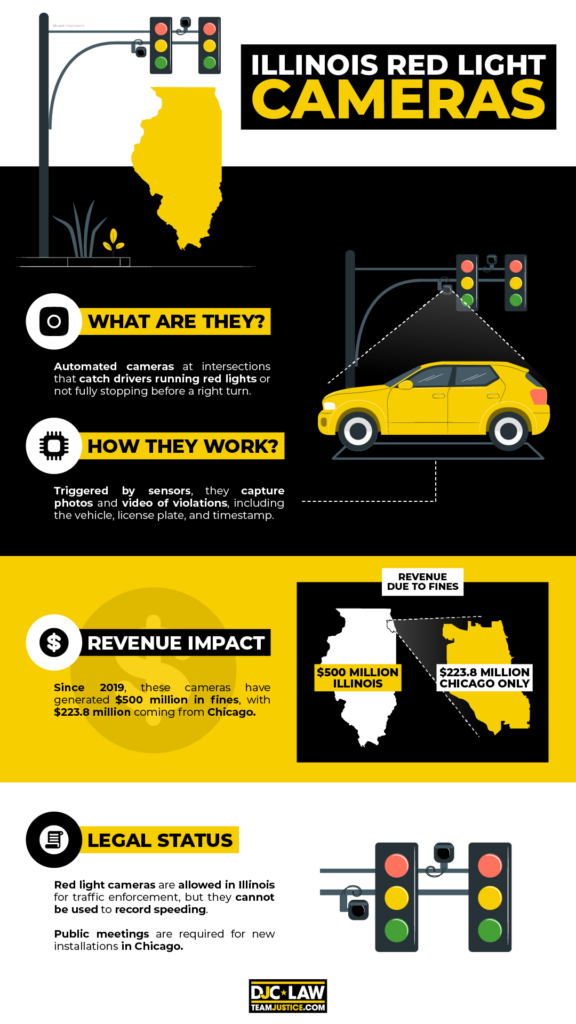
What Does it Mean to Run a Red Light?
Running a red light means entering an intersection whenever the signal is red. Not running a red light means coming to a complete stop and waiting for it to turn green. However, some intersections allow you to come to a complete stop and take a right turn, which wouldn’t count as running a red light.
Although some people grumble that these cameras are designed to act as a revenue stream for the state, this isn’t strictly true. According to the Journal of Safety Research, intersections without red light cameras see around 3.2 drivers running red lights every hour.
Are Red Light Cameras Legal in Illinois?
Considerable confusion exists regarding whether red light cameras are legal in Illinois. Under Illinois Law, the state government classifies the red light camera program as part of the state’s automated traffic law enforcement system, meaning they are permitted.
However, the legislation is clear in that counties and municipalities can’t use this system to record a vehicle’s speed but can use it to catch red light runners. That’s why these cameras don’t record vehicle speed.
Another quirk of the system is that the Chicago City Council requires the Department of Transportation (DOT) to hold a public meeting before creating new red light camera intersections. That’s why you don’t see them at every intersection statewide.
How Much is a Red Light Camera Ticket in Illinois?
Illinois has claimed vast sums from red light tickets over the years. Your fine depends on the city or town, but the most common sum is $100 per violation. However, the cost of your ticket can vary due to additional fees. If you fail to pay your ticket on time, your fine will double.
Let’s go through what a red light camera ticket in Illinois could cost:
Fine – $100 (average)
Boot Fee – $60-$400
Towing Charges – $150
Storage Fee – $20 per day for the first five days, rising to $35 a day afterward.
Note that if your vehicle is impounded and towed, the fees will rise if you drive something weighing more than 8,000 lbs. In this case, the tow fees are thus:
Towing Charges – $250
Storage Fee for the First Five Days – $60 per day.
Storage Fee After Five Days – $100 per day.
Granted, most drivers won’t suffer the ignominy of having their vehicles impounded because they ran a red light and carried on their merry way with no accidents. On the other hand, it’s good to see how quickly a violation could escalate.
Are Red Light Camera Tickets Enforceable in Illinois?
Enforceability concerns go back to the confusion over whether red light camera tickets in Illinois are legal. Tickets are completely enforceable because they’re part of the public traffic enforcement system and are backed by legislation dating back to 2003. Attempting to evade your ticket will only increase how much it costs you.
Nobody will conduct dawn raids on your home over a red light ticket, but your ticket will include a payment date. If you breeze past this date, your vehicle can be legally booted. In the most severe cases, it can be towed entirely.
All drivers have the right to dispute any red light ticket they get, but simply refusing to pay is ticket evasion and will be treated like not paying any other ticket for a traffic violation.
Do Red Light Camera Tickets Go on Your Driving Record in Illinois?
Red light camera tickets don’t appear on your driving record because they’re not classified as moving violations. In other words, these tickets are treated like not wearing a seat belt or getting a parking ticket.
Violations that don’t go on your driving record can’t lead to losing your license or increasing your insurance rates without aggravating factors.
For example, if you breeze through a red light at speed and crash into another vehicle, the act of running a red light won’t go on your record, but your crash certainly might.
How Do I Find Out if I Got a Red Light Ticket in Illinois?
Drivers can check if they got a red light camera ticket online using the relevant online platform for their county or city. For example, the City of Chicago has its own portal. Use your license plate or driving license number to determine whether you got a ticket. Most violations are uploaded instantly because everything is connected to the automated traffic enforcement system.
Generally, if you aren’t sure whether you got a ticket, you’ll still receive a physical ticket in the mail. Most tickets are sent out within five to seven days. Your ticket will include how much you’ll have to pay and when you’ll need to pay it. All tickets have a payment date of 25 days from when the violation occurred.
Note that it’s usually better to search for your ticket and pay for it online. If you pay your ticket online and still receive a physical ticket in the mail, you don’t have to pay it twice.
How Long Are Camera Violations Stored Online?
All drivers have the right to see footage of the violation. With your ticket information, you can search for your ticket and the accompanying footage through the relevant county website. All camera violations are stored online for two years before being automatically deleted.
If you’re asking whether red light camera footage violates your privacy, it doesn’t in Illinois. That’s because driving is a regulated activity. Anyone with a license to participate in a regulated activity has already agreed to follow the rules of the road, meaning that enforcement efforts don’t violate an American’s right to privacy.
Can I View Red Light Camera Footage?
Yes, all drivers can view red light camera footage showing their violations. Do this online by entering the information from your ticket and some personal details, such as your license plate number. The site will generate your footage to look at.
Although it can be interesting to see your violation, most drivers are looking for discrepancies that could get them out of a ticket. Most red light cameras installed in Illinois are advanced enough that getting ticketed in error is an extremely rare occurrence.
However, there are some situations where this footage could be helpful, such as if you’re filing a personal injury lawsuit in Chicago after a resulting car accident. Moreover, perhaps your vehicle was stolen, and you received a ticket because the thief ran a red light in your car.
What are the Defenses to a Red Light Violation?
Red light violations are few and far between because these advanced cameras generally don’t make mistakes. All tickets issued for automated traffic law violations go to the registered owner of the vehicle, regardless of who’s driving, unless it was reported stolen or it was being leased at the time. However, a limited number of defenses for red light camera violations exist, including:
The operator was issued a Uniform Citation for the same incident by a police officer at the scene.
The vehicle was reported stolen when the violation occurred and had yet to be recovered.
The vehicle was leased to someone else, such as in the case of a rental car.
The vehicle was classified as an authorized emergency vehicle.
The vehicle was yielding to an authorized emergency vehicle.
The vehicle was involved in a lawful funeral procession.
In short, few scenarios exist where there’s a genuine reason that could get you out of a red-light ticket.
Do Red Light Tickets Affect Insurance?
Red light tickets have no impact on your insurance rates because they aren’t classified as moving violations. When something isn’t a moving violation in Illinois, it doesn’t appear on your driving record, meaning your insurer won’t actually know you have received one of these tickets.
Non-moving violations also mean that you could rack up a red light ticket every day for a year, and your insurance premiums wouldn’t move. Likewise, you wouldn’t have to worry about racking up an enormous number of parking tickets and then getting your license suspended – unless you failed to pay the ticket.
So, red light tickets are generally just a fine, and nothing more will be said. However, bear in mind that states like New York and California often take a stricter view than Illinois.
What are the Legal and Financial Impacts of Running a Red Light on Your Personal Injury Claim?
Running a red light alone won’t impact you any more than having to pay a ticket. Despite the relative lack of serious consequences, it’s critical to remember that running a red light is still a boneheaded move that could result in a serious car accident.
For example, an IIHS study reported 1,109 people died in 2021 because someone ran a red light. To make things worse, most of the people who died were pedestrians and cyclists rather than the drivers who committed the offense.
People forget that, like speeding, it isn’t only you who’s impacted by the violation. Red light running that results in an accident might lead to serious injuries, resulting in significant costs and even jail time.
No red light violation alone will destroy your life, but a crash caused by one could turn your world upside down.
How a Chicago Personal Injury Lawyer Can Help
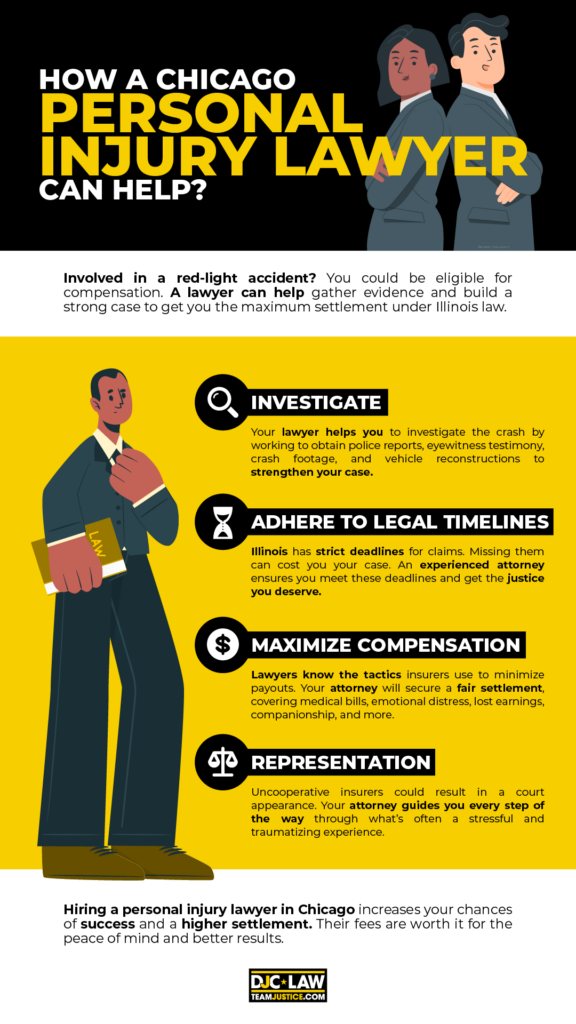
Were you involved in a car accident caused by another driver running a red light? Then, you could be entitled to compensation. Under Illinois’ at-fault laws, it’s the party who was at fault that pays the damages, and running a red light is a huge factor in determining who was to blame.
Your Chicago personal injury lawyer can help you build your case, fight your corner, and ensure you get the maximum compensation you deserve. Here are some of the ways they help thousands of Illinoisans:
Investigate – Your lawyer helps you to investigate the crash by working to obtain police reports, eyewitness testimony, crash footage, and vehicle reconstructions to strengthen your case.
Adhere to Legal Timelines – The statute of limitations in Illinois is strict, and courts regularly set deadlines. Fail to meet these deadlines and you could lose your right to claim entirely. Experienced attorneys work day and night to adhere to these timelines and ensure you get the justice you deserve.
Maximize Your Compensation – Lawyers know the tricks insurers use to get out of paying a fair settlement. Your attorney will compile an exact settlement value that accounts for not only your direct bills but also emotional anguish, future lost earnings, lost companionship, and more.
Representation – Uncooperative insurers could result in a court appearance. Your attorney guides you every step of the way through what’s often a stressful and traumatizing experience.
Hiring a personal injury lawyer in Chicago means paying part of your final settlement for them, but the fact is that this is offset by increased success rates and increased average settlement amounts. Plus, you can’t put a price on your peace of mind when recovering from your injuries.
How Your Personal Injury Settlement Can Be Impacted by Running a Red Light
Personal injury settlements are heavily impacted if one or more parties are found to be running a red light. Under Illinois’ modified comparative negligence laws, blame is assigned in percentage terms.
For example, a court might hold you responsible for 20% of the blame through your actions or inaction. This means any settlement amount would be slashed by 20% to account for this blame. Naturally, if you were running a red light and got injured, it’s unlikely you’d receive the average personal injury settlement amount in Illinois because you committed a traffic violation that contributed to your car accident.
Illinois law states that you must be apportioned less than 50% of the blame to be eligible for monetary compensation.
Is Illinois a No-Fault State?
Illinois is an at-fault state, meaning it’s the party who’s responsible for an accident that must pay up. This could be the at-fault driver’s insurer or the driver themselves if they weren’t driving without insurance or if their insurance won’t cover the entire settlement amount.
Unlike a no-fault state, whether you receive compensation or not depends on whether your actions contributed to the accident. The lack of Illinois no-fault state laws means running a red light can have such a substantial impact on your ability to claim compensation.
Steps to Take After an Accident Involving a Red Light Violation
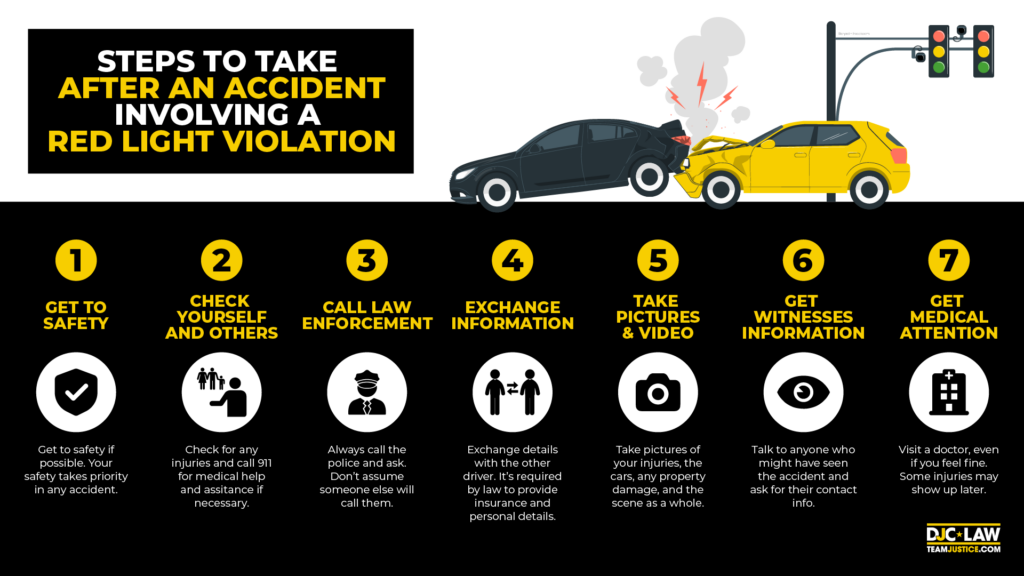
Red light accidents often lead to severe injuries because drivers aren’t expecting to see someone, thus leaving them little opportunity to defend themselves. If you’re involved in a red light traffic accident, what you do in the immediate aftermath could impact your ability to maximize your final settlement.
Here’s a rundown of what to do after a Chicago car accident in 2024:
Step One – Get to safety if you’re able. Your safety takes priority in any accident.
Step Two – Check yourself and your passengers for any injuries. Call 911 for an ambulance if necessary.
Step Three – Always call law enforcement and ask for an officer to attend. Don’t assume someone else will call them.
Step Four – Exchange details with the other driver. You’re legally obligated to provide your name and insurance details, otherwise, it’s considered a hit-and-run accident. Nobody is allowed to leave the scene without exchanging their details first.
Step Five – Take pictures of your injuries, the cars, any property damage, and the scene as a whole.
Step Six – Talk to anyone who might have seen the accident and take down their details. Remember, eyewitnesses aren’t required to give their details, so you’ll have to respect that.
Step Seven – Travel to a medical facility, even if you’re feeling fine, for a full examination. Remember, many injuries might not surface for hours or days after the accident, including whiplash and concussion.
After returning home, your next step should be to get in touch with a personal injury attorney about what’s happened. Never speak to an insurance company or even friends and family about your red light accident, as this could compromise your ability to claim a fair settlement later. Let your lawyer do the talking.
Red Light Camera Tickets FAQs
Can you fight a red-light camera ticket in Chicago?
All registered owners of vehicles have the right to contest their red light tickets. In Chicago, you have seven days from being issued a ticket to contest the violation, so you must act immediately, or you’ll have to pay the ticket regardless.
How long does a red-light ticket stay on your record in Illinois?
Red light tickets don’t appear on your record because they’re considered administrative violations, not moving violations. However, any moving violations, such as speeding, stay on your record for four to five years.
What happens if you run a yellow light and it turns red in Illinois?
Drivers who run a yellow light into an intersection and see the light turning red can still be charged with running a red light. This is because it’s about when you entered the intersection, not when you passed the traffic signals themselves. Generally, you should obey traffic signals and avoid running yellow lights entirely.



